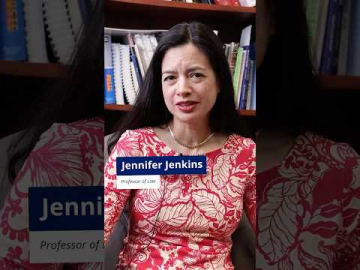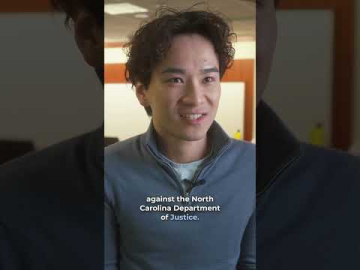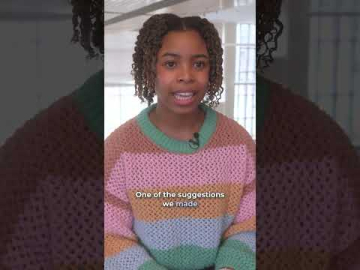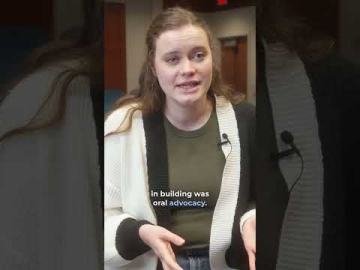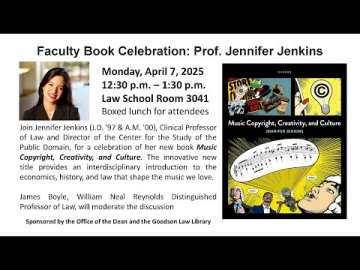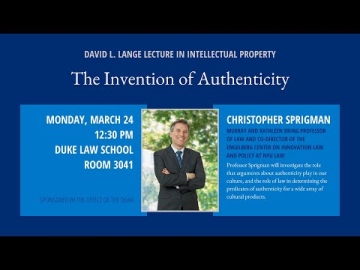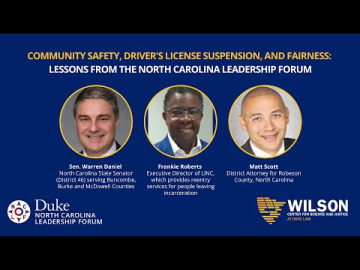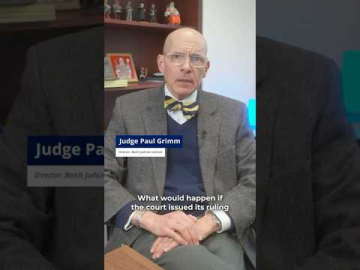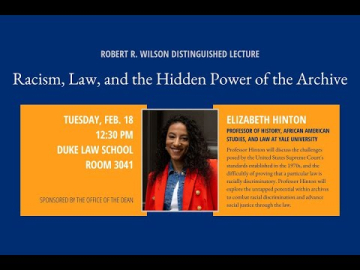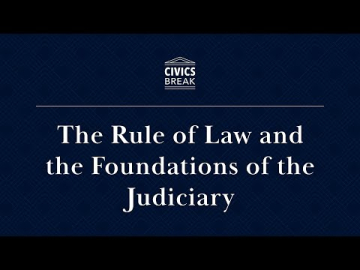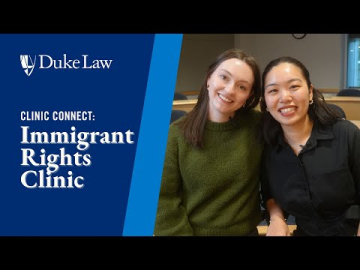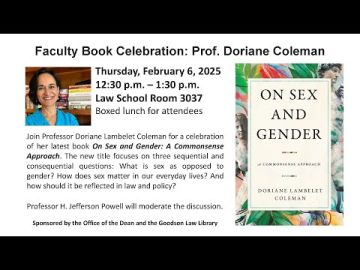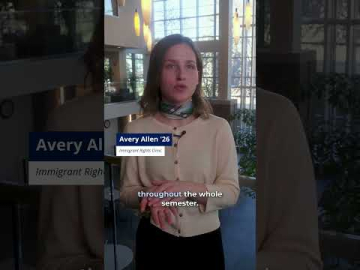Video Archive
Why do so many songs sound alike? In the latest episode of Legal Brief, Professor Jennifer Jenkins breaks down the challenges of applying copyright law to music, from the limits of musical vocabulary to the fine line between inspiration and infringement.
The International Emergency Economic Powers Act (IEEPA) gives the president sweeping authority to regulate foreign commerce, but how? In the latest episode of Legal Brief, Professor Tim Meyer breaks down this 1977 statute and how it can be used to impose tariffs. ⚖️
#dukelaw #lawyer #trade
Can an artist's style be copyrighted? In this week’s episode of Legal Brief, Professor Chris Buccafusco explains why courts are divided on whether an artist’s style can be protected and how the emergence of generative AI is raising new questions about where copyright draws the line between idea and expression. ⚖️🎨
#dukelaw #copyright
2L Yumu Chen discusses his goals he wanted to accomplish with the Civil Justice Clinic, his current work, and his future as a lawyer.
In this week’s episode of Legal Brief, Judge Paul Grimm, Director of the Bolch Judicial Institute, explains how the Constitution protects judicial independence and why that protection is essential to the rule of law. ⚖️
Former Chief Justice of Pakistan Tassaduq Hussain Jillani, recipient of the 2025 Bolch Prize for the Rule of Law, joined Paul W. Grimm for a conversation about his life and jurisprudence at Duke Law School.
During their conversation, Justice Jillani shared his judicial philosophy, background on his landmark rulings on minority rights and religious freedom, and his refusal to legitimize an unconstitutional regime during Pakistan’s 2007 state of emergency. He also spoke broadly on the ethical foundations of judicial independence and the role of courts in democratic societies. Dean Kerry Abrams of Duke Law School offered introductory remarks (00:03). Justice Jillani’s former law clerk, Annum Haider, was among the attendees, and beginning at 58:22, she spoke about his impact on her and his mastery of interpreting the law.
This conversation was hosted as part of celebrations at Duke University on April 16, 2025, honoring Justice Jillani as the 2025 recipient of the Bolch Prize for the Rule of Law.
For more information about the prize, visit http://judicialstudies.duke.edu/.
Justice Tassaduq Hussain Jillani, the former Chief Justice of the Supreme Court of Pakistan, was celebrated as the 2025 recipient of the Bolch Prize for the Rule of Law during a ceremony held at Duke University’s Nasher Museum of Art on April 16, 2025.
Paul W. Grimm, a retired federal judge and director of the Bolch Judicial Institute, presented Justice Jillani with the prize (35:53), and afterward, Justice Jillani delivered a keynote address (40:10).
Speakers at the ceremony included Dr. Joshua Salaam, director and chaplain at Duke University’s Center for Muslim Life (00:05); Dean Kerry Abrams of Duke Law School (03:07); Taiyyaba Qureshi, founding president of the North Carolina Muslim Bar Association (08:15); Justice Adèle Kent of the Court of King’s Bench of Alberta, ret. (12:21); Bill Neukom, co-founder and CEO of the World Justice Project (24:15); and Susan Bass Bolch, founder of the Institute (56:33).
ABOUT THE PRIZE
The Carl and Susan Bolch Prize for the Rule of Law is awarded annually to an individual or organization who has demonstrated extraordinary dedication to the rule of law and advancing rule of law principles around the world. By honoring those who do this work, the Bolch Prize draws attention to the ideals of justice and judicial independence and to the constitutional structures and safeguards that undergird a free society. To learn more, visit http://judicialstudies.duke.edu/.
What is the Foreign Corrupt Practices Act?
In the latest episode of Legal Brief, Professor Rachel Brewster breaks down the FCPA, its impact on global business, and what happens when enforcement is put on pause. ⚖️
3L Mary Peyton Brown discusses why she wanted to pursue environmental law, the work she accomplished in the clinic, and why it’s important to get involved with the Environmental Law and Policy Clinic.
3L Indya Woodfolk discusses her passion for environmental law, the work she was able to accomplish in the Environmental Law and Policy Clinic and why it’s important to get involved with the ELPC.
2L Rosa Gibson discusses her passion for advocacy, the work she was able to accomplish in the Criminal Defense Clinic, and why it’s important to get involved with the clinic.
3L Eddy Fernandez discusses why he wanted to get involved with the Criminal Defense Clinic and the impact it left on his legal journey.
3L Ali Schmidt discusses her work with the Criminal Defense Clinic, and how vital it was to her future legal career.
Join the celebration for Jennifer Jenkins (J.D. '97 & A.M. '00), Clinical Professor of Law and Director of the Center for the Study of the Public Domain. Her new book Music Copyright, Creativity, and Culture (Oxford University Press, 2025: http://duke.is/v/bgyn) is an interdisciplinary introduction to the economics, history, and law that shape the music we love. The book is both innovative and readable, presenting its subject through case studies, timelines, and even excerpts from a graphic novel. James Boyle, William Neal Reynolds Distinguished Professor of Law, will moderate the discussion.
Co-sponsored by the Goodson Law Library and Office of the Dean.
Can a president use emergency powers to impose tariffs?
In the latest episode of Legal Brief, Professor Tim Meyer breaks down the Major Questions Doctrine and how it might shape future legal challenges to executive power.
#dukelaw #law #duke #majorquestionsdoctrine
Join Shitong Qiao, Professor of Law and Ken Young-Gak Yun and Jinah Park Yun Research Scholar, for a celebration of his new book The Authoritarian Commons: Neighborhood Democratization in Urban China (Cambridge University Press, 2025: http://duke.is/y/8682). Based on extensive fieldwork across China, this book provides an ethnographic account of how Chinese homeowners practice democracy in and beyond their condominium complexes. Jedediah Purdy, Raphael Lemkin Distinguished Professor of Law, will moderate the discussion.
Sponsored by the Office of the Dean and the Goodson Law Library.
Please join us for this special Duke 100 Centennial Event. In 1961, David Robinson, II made history as one of the first three Black students to desegregate Duke. Mr. Robinson's enrollment changed the University forever, setting Duke on a path to becoming more inclusive and forging the foundation for the community we enjoy today. Mr. Robinson had a distinguished career following his graduation from Duke Law in 1964, serving as attorney for the Federal Reserve, senior counsel for the Xerox Corporation, and the first general counsel of the Eleventh Judicial Circuit of Florida. Mr. Robinson now is the only surviving member of this historic group that desegregated Duke. He is living history! As background, discussions about the future of the U.S. experiment with democracy often center on threats to the franchise and to the freedom of expression. Yet, a heavy focus on one or two rights obscures the ways in which democracy is interwoven with, and often dependent upon, other rights and freedoms. Moreover, 2025 provides a particularly opportune moment for a Democracy and Rights conversation as the U.S. marks the anniversary of major civil rights milestones, including the 70th anniversary of Brown v. Board of Education (1954 and 1955), the 60th anniversary of the Civil Rights Act of 1964, the Voting Rights Act of 1965, and the Fair Housing Act of 1968, and the 50th anniversary of Roe v. Wade (1973). This event, therefore, will seek to explore the ways in which democracy intersects with, and is often reliant upon, myriad rights and freedoms, honoring Mr. Robinson's remarkable accomplishments and inviting his insights on, among other things, the state of U.S. democracy and the civil rights of people living here. Professor H. Timothy Lovelace, Jr., John Hope Franklin Research Scholar and Professor of Law, will serve as interviewer for this event.
This is a Duke Law Center on Law, Race & Policy ("CLRP") event in partnership with Duke 100 Centennial, the Duke Law DEI Committee, and the Duke Law Black Law Students Association.
As part of the Human Rights in Practice series, join the Center for International and Comparative Law and the International Human Rights Clinic for this program featuring Sarah Saadoun, Senior Researcher and Advocate, Poverty and Inequality, Human Rights Watch, who will discuss building a human rights economy. Moderated by Aya Fujimura-Fanselow, Clinical Professor (Teaching) & Supervising Attorney, International Human Rights Clinic, Duke Law. Co-sponsored by American Constitution Society, Business Law Society, Duke Human Rights Center at the Franklin Humanities Institute, Human Rights Law Society, International Law Society, and National Lawyers Guild.
Christopher Sprigman, Murray and Kathleen Bring Professor of Law and Co-Director of the Engelberg Center on Innovation Law and Policy at NYU Law will deliver the annual David L. Lange Lecture in Intellectual Property Law. The title of the lecture is "The Invention of Authenticity." Professor Sprigman will investigate the role that arguments about authenticity play in our culture, and the role of law in determining the predicates of authenticity for a wide array of cultural products.
Sponsored by the Office of the Dean.
Over four meetings last spring, North Carolina leaders and impacted people from government, business, advocacy, and the community came together to discuss an important question: What should we do to make North Carolina communities safe? In this conversation, three participants from the Forum (Sen. Warren Daniel, North Carolina State Senator (District 46) serving Buncombe, Burke and McDowell Counties; Frankie Roberts, Executive Director of LINC, which provides reentry services for people leaving incarceration; Matt Scott, District Attorney for Robeson County, North Carolina) shared what they learned from working across the political aisle to understand different points of view, productively disagree, and have healthy discussions to advance solutions to improve the lives of North Carolinians.
We also talked more in-depth with them about a critical issue in North Carolina – driver’s license suspensions resulting from unpaid traffic fines and fees and failing to appear in court. Currently, nearly one million North Carolinians are impacted by this issue. We delved into the key question: how can we solve this issue while taking safety, accountability, and fairness into account?
Sponsored by the Wilson Center for Science and Justice at Duke Law and the North Carolina Leadership Forum
Judge Paul Grimm, director of the Bolch Judicial Institute, explains the concept of the rule of law.
#dukelaw #duke #law #judge
Who decides if a law is constitutional? In the latest episode of Legal Brief, Judge Paul Grimm, Director of the Bolch Judicial Institute (@bolch_judicial), explains judicial review and its origins in Marbury v. Madison. ⚖️
#dukelaw #judicialreview
Can a president impose tariffs without Congress? In the latest episode of Legal Brief, Professor Tim Meyer breaks down the legal frameworks that grant—and limit—executive authority on tariffs. ⚖️
#dukelaw #tariffs
What happens if a court issues a ruling—but it’s ignored? In the latest episode of Legal Brief, Judge Paul Grimm explains why enforcing judicial orders is essential to upholding the rule of law and protecting constitutional rights. ⚖️
#dukelaw #duke #court #law
Preston Shipp is the Associate Policy Director for the Campaign for the Fair Sentencing of Youth. In this role, Preston provide strategic guidance, support, and leadership to states that are working to eliminate life without parole and other extreme sentences for children. He works directly with state-level advocates and legislators. In this book, Preston, a former Assistant Attorney General for the State of Tennessee whose work kept people in prison, shares his story of how teaching incarcerated people made him rededicate his life to juvenile justice reform. Lunch will be provided, first come, first served. Sponsored by the Wilson Center for Science and Justice and the Duke Decarceration Project. This event was the part of the Wilson Center's Novel Justice Series, which invites authors of recent scholarship on the criminal legal system to discuss their work. Moderated by Benjamin S. Finholt.
As part of the Human Rights in Practice series, join the Center for International and Comparative Law and the International Human Rights Clinic for this program featuring Aya Fujimura-Fanselow, Clinical Professor of Law and Supervising Attorney, International Human Rights Clinic, Duke Law; Seree Nonthasoot, Member, United Nations Committee on Economic, Social, and Cultural Rights; and Mara Tignino, Lead Legal Specialist, Geneva Water Hub. Moderated by Jillian Rafferty, Clinical Fellow, International Human Rights Clinic, Duke Law. Speakers will discuss food and water security, and the economic, social, and cultural rights in practice.
Co-sponsored by American Constitution Society, Duke Environmental Law and Policy Clinic, Duke Environmental Law Society, Duke Human Rights Center at the Franklin Humanities Institute, Human Rights Law Society, International Law Society, National Lawyers Guild.
Since 1995, the Duke Law’s Center on Law, Ethics and National Security (LENS) has hosted an annual national security law conference in Durham, N.C. The conference promotes education and discussion of the complex and diverse issues involved in national security, such as the legal and policy implications of artificial intelligence, cyber operations, the militarization of outer space, maritime law, counterterrorism operations at home and abroad, the international law of armed conflict, the impact of security issues on international business endeavors, and the ethical issues of the practice of national security law.
Fireside Chat: Lt Gen John N.T. “Jack” Shanahan, USAF (Ret.) former Director of the Department of Defense’s Joint Artificial Intelligence Center.
Discussant: Prof Gary Corn, Director of the Technology, Law & Security Program and adjunct professor at American University’s Washington College of Law.
Since 1995, the Duke Law’s Center on Law, Ethics and National Security (LENS) has hosted an annual national security law conference in Durham, N.C. The conference promotes education and discussion of the complex and diverse issues involved in national security, such as the legal and policy implications of artificial intelligence, cyber operations, the militarization of outer space, maritime law, counterterrorism operations at home and abroad, the international law of armed conflict, the impact of security issues on international business endeavors, and the ethical issues of the practice of national security law.
Shortburst: “Climate Change, Environmental Law, and National Security”
Speaker: Prof. Mark Nevitt, Emory Law, USN (Ret)
Since 1995, the Duke Law’s Center on Law, Ethics and National Security (LENS) has hosted an annual national security law conference in Durham, N.C. The conference promotes education and discussion of the complex and diverse issues involved in national security, such as the legal and policy implications of artificial intelligence, cyber operations, the militarization of outer space, maritime law, counterterrorism operations at home and abroad, the international law of armed conflict, the impact of security issues on international business endeavors, and the ethical issues of the practice of national security law.
Speaker: Prof Curtis A Bradley, Allen M. Singer Distinguished Service Professor of Law, the Law School, University of Chicago; author, Historical Gloss and Foreign Affairs: Constitutional Authority in Practice (2024)
Since 1995, the Duke Law’s Center on Law, Ethics and National Security (LENS) has hosted an annual national security law conference in Durham, N.C. The conference promotes education and discussion of the complex and diverse issues involved in national security, such as the legal and policy implications of artificial intelligence, cyber operations, the militarization of outer space, maritime law, counterterrorism operations at home and abroad, the international law of armed conflict, the impact of security issues on international business endeavors, and the ethical issues of the practice of national security law.
Maj. Gen. Charlie Dunlap, USAF (Ret.), LENS Executive Director
Speaker: Mr. Dean Cheng, Senior Advisor to the China program at the U.S. Institute of Peace
Since 1995, the Duke Law’s Center on Law, Ethics and National Security (LENS) has hosted an annual national security law conference in Durham, N.C. The conference promotes education and discussion of the complex and diverse issues involved in national security, such as the legal and policy implications of artificial intelligence, cyber operations, the militarization of outer space, maritime law, counterterrorism operations at home and abroad, the international law of armed conflict, the impact of security issues on international business endeavors, and the ethical issues of the practice of national security law.
Speaker: Prof Christopher J. Borgen, Co-Director of the Center for International and Comparative Law at St. John's University School of Law; a “core expert” for the “The Woomera Manual on the International Law of Military Space Operations” (2024).
Since 1995, the Duke Law’s Center on Law, Ethics and National Security (LENS) has hosted an annual national security law conference in Durham, N.C. The conference promotes education and discussion of the complex and diverse issues involved in national security, such as the legal and policy implications of artificial intelligence, cyber operations, the militarization of outer space, maritime law, counterterrorism operations at home and abroad, the international law of armed conflict, the impact of security issues on international business endeavors, and the ethical issues of the practice of national security law.
Shortburst “Biosecurity”
Speaker: Ms. Lala R. Qadir, Senior Director for Technology Security and AI Policy, Microsoft, formerly Chief of Staff to the National Security Division at the White House Office of Science and Technology.
As part of the Human Rights in Practice series, join the Center for International and Comparative Law and the International Human Rights Clinic for this program featuring Thomas Becker, Legal and Policy Director and Senior Clinical Supervisor, University Network on Human Rights; and Katherine Gallagher, Senior Staff Attorney, Center for Constitutional Rights. Speakers will discuss transnational litigation to protect human rights. Moderated by Jayne Huckerby, Clinical Professor of Law and Director, International Human Rights Clinic, Duke Law. Cosponsored by ACLU, American Constitution Society, Duke Human Rights Center at the Franklin Humanities Institute, Human Rights Law Society, International Law Society, and National Lawyers Guild.
Join Brandon L. Garrett, L. Neil Williams, Jr. Distinguished Professor of Law and Director of the Wilson Center for Science and Justice, for a celebration of his latest book, Defending Due Process: Why Fairness Matters in a Polarized World (Polity Press, 2025: http://duke.is/5/xuxv). The new book explores why institutions are under pressure to put desired outcomes before fair process, and how citizens can find common ground to "mend political polarization, cool simmering distrust of government, prevent injudicious errors, and safeguard constitutional rights." James E. Coleman Jr., John S. Bradway Distinguished Professor of the Practice of Law, will moderate the discussion.
Join us for the Robert R. Wilson Distinguished Lecture featuring Professor Elizabeth Hinton of Yale Law School. Professor Hinton's research explores the persistence of poverty, racial inequality, and urban violence in the 20th century United States. In her lecture titled "Racism, Law, and the Hidden Power of the Archive," Professor Hinton will discuss the challenges posed by the United States Supreme Court's standards established in the 1970s, and the difficultly of proving that a particular law is racially discriminatory. Professor Hinton will explore the untapped potential within archives to combat racial discrimination and advance social justice through the law.
Sponsored by the Office of the Dean.
In this module, you will learn about the roles, responsibilities, and decision-making processes of judges. This module explores the various ways federal and state judges get their jobs, what it means to be fair and impartial, and the legal principles, ethical codes, traditions, and guidelines that constrain judicial decision-making.
This video was produced by the Bolch Judicial Institute of Duke Law School as part of “Civics Break,” a learning series focused on courts and the judiciary. Learn more at http://judicialstudies.duke.edu/civics-break
In this module, you will learn about the rule of law and the constitutional foundation of the U.S. judicial system. The U.S. Constitution outlines a government system that balances power among three branches of government: legislative, executive, and judicial. This module explores the powers and responsibilities of the judicial branch, how the judiciary and U.S. law have developed over time, and how state and federal courts work together to resolve disputes, protect our individual rights and liberties, and uphold the rule of law.
This video was produced by the Bolch Judicial Institute of Duke Law School as part of “Civics Break,” a learning series focused on courts and the judiciary. Learn more at http://judicialstudies.duke.edu/civics-break
In this learning module, you will learn about the vital role of citizens in supporting and engaging with the judicial system. It explores the various types of jury service, opportunities to voice support for reform and change in the courts, and how to become an educated consumer of news and information about judges and courts. From serving as a juror to voting to sharing accurate news, American citizens have the right and responsibility to engage with the courts and ensure that the judicial branch fulfills its constitutional obligations.
This video was produced by the Bolch Judicial Institute of Duke Law School as part of “Civics Break,” a learning series focused on courts and the judiciary. Learn more at http://judicialstudies.duke.edu/civics-break
3Ls Olivia Callan and Isabella Cheng sit down to discuss their experiences working in the Immigrant Rights Clinic. They discuss why they chose the clinic, how their classes prepared them, and their clients' positive impact on their futures as lawyers.
As part of the Human Rights in Practice series, join the Center for International and Comparative Law and the International Human Rights Clinic for this program featuring Verity Coyle, Senior Advisor and Campaigner, International Secretariat, Amnesty International; Nyari Pariola, Advocacy Specialist, Centre for the Study of Violence and Reconciliation; Emily K. Wanger, Associate, Emery Celli Brinckerhoff Abady Ward & Maasel; and moderated by Jillian Rafferty, Clinical Fellow, International Human Rights Clinic, Duke Law.
Speakers will discuss prisoners' rights in the U.S. and abroad.
Co-sponsored by the ACLU, American Constitution Society, Duke Decarceration Project, Duke Human Rights Center at the Franklin Humanities Institute, Duke Law Wrongful Convictions Clinic, Duke Law Criminal Defense Clinic, Human Rights Law Society, Innocence Project, International Law Society, National Lawyers' Guild.
Join Doriane Coleman, Thomas L. Perkins Distinguished Professor of Law, for a celebration of her latest book, *On Sex and Gender: A Commonsense Approach* (publisher description at http://www.simonandschuster.com/books/On-Sex-and-Gender/Doriane-Lambel…). The new title focuses on three sequential and consequential questions: What is sex as opposed to gender? How does sex matter in our everyday lives? And how should it be reflected in law and policy? Professor H. Jefferson Powell will moderates the discussion.
Sponsored by the Office of the Dean and Goodson Law Library.
2L Avery Allen explains why she decided to work in the Immigrant Rights Clinic and what that means for her future career.
2L Avery Allen explores the many opportunities she had to work on cases in the Immigrant Rights Clinic.
#dukelaw #immigrantrights
2L Avery Allen goes in depth about her favorite experiences of working in the Immigrant Rights Clinic.
#dukelaw #immigrantrights
2L Juan Colin discusses why he chose to work in the Immigrant Rights Clinic and how it impacted his experience at Duke Law.
#dukelaw #immigrantrights
2L Juan Colin navigates the many skills he learned while in the Immigrant Rights Clinic.
2L Juan Colin explains his best experiences in the Immigrant Rights Clinic, including getting the opportunity to work with Prof. Kate Evans, director of the Immigrant Rights Clinic.
In our complex modern society, federal agencies regulate nearly every important element of American life, from the quality and safety of our air, water and food to the safety and availability of medications and consumer products. Recent Supreme Court decisions are significantly changing how those agencies can operate. Agencies may no longer be able to regulate matters of great economic and political significance without express Congressional direction. No longer are courts required to defer to an agency’s expertise when interpreting ambiguities in regulatory statutes. Regulated parties from whom an agency seeks civil penalties may now be entitled to a jury trial. And people or companies that want to challenge agency regulations may now have a much longer window of time to do so.
The Supreme Court’s historic decisions relating to the authority of these agencies have the potential to radically change how businesses and institutions operate and how Americans live their day-to-day lives. This panel will explore the ramifications and far-reaching impacts of these Supreme Court decisions from the perspectives of the law, the courts, and regulated industries.
Panelists include:
Chief Judge Catherine Eagles, U.S. District Court for the Middle District of North Carolina
Senior Attorney David Doniger of the Natural Resources Defense Council
Jennifer Zachary, general counsel for Merck Inc.
Professor Stuart Benjamin of Duke Law School (moderator)
Sponsored by the Litigation Section of the American Bar Association, the Bolch Judicial Institute at Duke Law School, and the Berkeley Judicial Institute.
